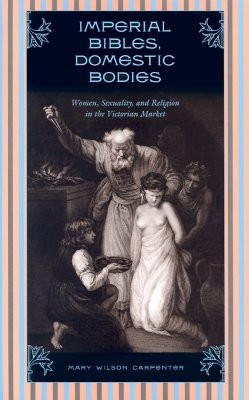
- We will send in 10–14 business days.
- Author: Mary Wilson Carpenter
- Publisher: Ohio University Press
- ISBN-10: 0821415158
- ISBN-13: 9780821415153
- Format: 15.4 x 23.9 x 2.1 cm, hardcover
- Language: English
- SAVE -10% with code: EXTRA
Reviews
Description
Of the many literary phenomena that sprang up in eighteenth-century England and later became a staple of Victorian culture, one that has received little attention until now is the "Family Bible with Notes." Published in serial parts to make it affordable, the Family Bible was designed to enhance the family's status and sense of national and imperial identity.
Imperial Bibles, Domestic Bodies reveals in its study of the production and consumption of British commercial Family Bibles startling changes in "family values." Advertised in the eighteenth century as providing the family with access to "universal knowledge," these Bibles suddenly shifted in the early nineteenth century to Bibles with bracketed sections marked "to be omitted from family reading" and reserved for reading "in the closet" by the "Master of the family." These disciplinary Bibles were paralleled by Family Bibles designed to appeal to the newly important female consumer. Illustrations featured saintly women and charming children, and "family registers" with vignettes of family life emphasized the prominent role of the "angel in the house."
As Mary Wilson Carpenter documents in Imperial Bibles, Domestic Bodies, the elaborate notes and "elegant engravings" in these Bibles bring to light a wealth of detail about the English commonsense view of such taboo subjects as same-sex relations, masturbation, menstruation, and circumcision. Her reading of literary texts by Charlotte Brontë, George Eliot, and Elizabeth Barrett Browning in the context of these commercial representations of the "Authorized Version" or King James translation of the Bible indicates that when the Victorians spoke about religion, they were also frequently speaking about sex.
- Author: Mary Wilson Carpenter
- Publisher: Ohio University Press
- ISBN-10: 0821415158
- ISBN-13: 9780821415153
- Format: 15.4 x 23.9 x 2.1 cm, hardcover
- Language: English English
Of the many literary phenomena that sprang up in eighteenth-century England and later became a staple of Victorian culture, one that has received little attention until now is the "Family Bible with Notes." Published in serial parts to make it affordable, the Family Bible was designed to enhance the family's status and sense of national and imperial identity.
Imperial Bibles, Domestic Bodies reveals in its study of the production and consumption of British commercial Family Bibles startling changes in "family values." Advertised in the eighteenth century as providing the family with access to "universal knowledge," these Bibles suddenly shifted in the early nineteenth century to Bibles with bracketed sections marked "to be omitted from family reading" and reserved for reading "in the closet" by the "Master of the family." These disciplinary Bibles were paralleled by Family Bibles designed to appeal to the newly important female consumer. Illustrations featured saintly women and charming children, and "family registers" with vignettes of family life emphasized the prominent role of the "angel in the house."
As Mary Wilson Carpenter documents in Imperial Bibles, Domestic Bodies, the elaborate notes and "elegant engravings" in these Bibles bring to light a wealth of detail about the English commonsense view of such taboo subjects as same-sex relations, masturbation, menstruation, and circumcision. Her reading of literary texts by Charlotte Brontë, George Eliot, and Elizabeth Barrett Browning in the context of these commercial representations of the "Authorized Version" or King James translation of the Bible indicates that when the Victorians spoke about religion, they were also frequently speaking about sex.


Reviews